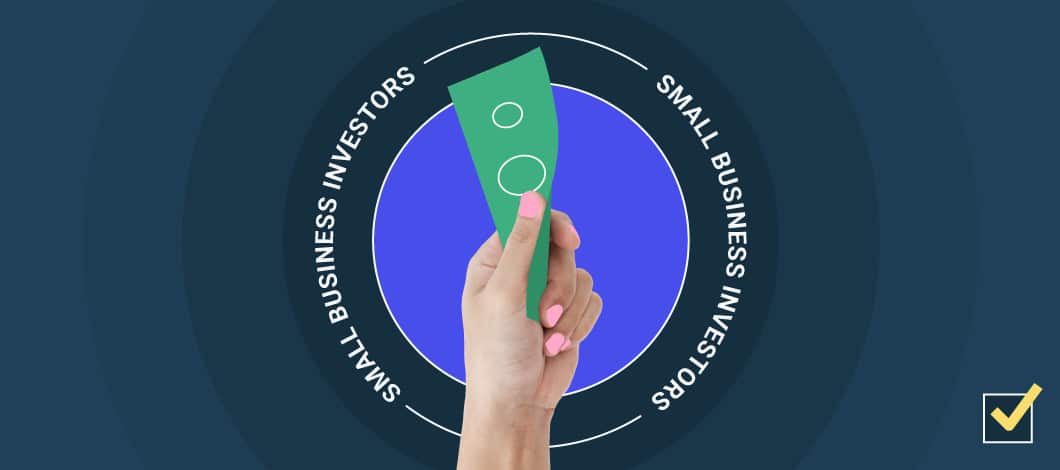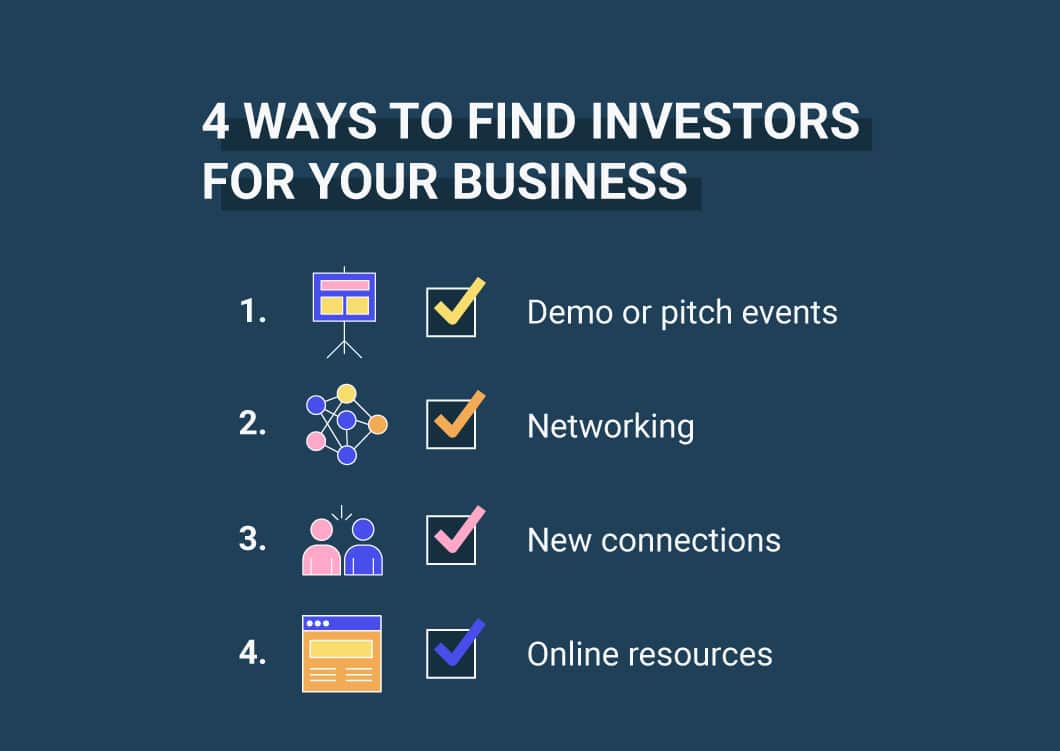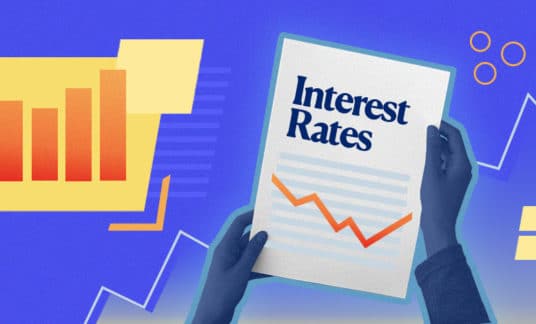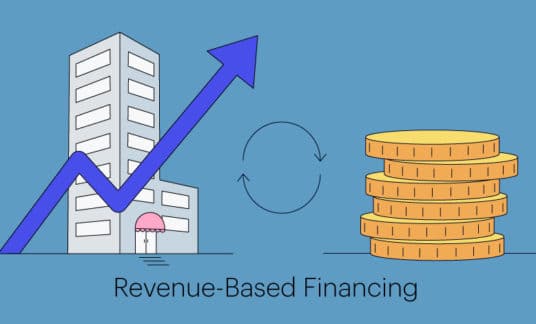Learning how to find investors for a small business doesn’t have to be as stressful as you think.
Thanks to the rise of online resources and startup incubators throughout the U.S., looking for investors is easier than ever.
Knowing about the different kinds of investors, what they can offer and how to find the right one could give you a leg up when trying to finance any stage of your business’s growth.
We’ll break down the various types of investors and which could be the best fit for your business. We’ll also take a look at the several options for connecting with investors, such as:
- Demo or pitch days
- Networking
- New connections
- Online resources
How to Find Investors for Your Small Business in 4 Steps
When you’re wondering how to get investors for your small business opportunity, here are a few strategies you can implement.
1. Attend ‘Demo’ or ‘Pitch’ Days
Demo days (or pitch days) get entrepreneurs in front of a group of investors looking to find the next big thing.
The structure of these days is a bit like the television show “Shark Tank”: Business owners pitch their ideas to a group of investors, who try to learn more about the company before setting up another meeting or negotiating the terms of a deal.
Many investment groups and startup incubators hold these events, so make sure to follow organizations like these to find an opportunity to pitch your business idea. Examples of pitch events include the National Black MBA Association Scale-Up Pitch Challenge and New Voices Foundation’s pitch competitions.
-
Small Business Tip
Many investors venture to trade shows, industry conferences and similar gatherings. Attending these events could get you facetime with investors interested in backing businesses in your industry.
2. Go to Your Network
A simple way to find investors for your small business is to tap your existing connections.
Ask other business owners you know if they can introduce you to an investor they know or have worked with. Many investors will trust the word of someone with whom they’ve had a successful working relationship.
If you went to college, see if any alumni are able to help. Many are loyal to their school and fellow alums.
Additionally, some colleges have created their own startup incubators and accelerators, designed to create a network of investors to help small businesses like yours find funding.
Your local chamber of commerce, industry organizations and Small Business Development Centers all have connections. They may be a great resource to find investors looking specifically for businesses in your area or industry.
3. Explore New Connections
Sometimes you have to take matters into your own hands when you’re wondering how to find investors for your small business.
There’s no guarantee, but you could find potential investors through cold-calling, emails or on social media sites, such as LinkedIn.
If you know an investor’s background, preferences and requirements, you can narrow your search and improve your odds of finding success.
4. Use Online Resources
When you’re seeking strategies for how to find investors for your small business, consider what web-based resources are available to you.
For example, online crowdfunding sites, such as Kickstarter, offer a way to fund smaller projects and fill in funding gaps that other investors haven’t. Kickstarter is an example of a crowdfunding site that’s product-driven, which allows you to offer the product itself as a reward for investing. This keeps the equity of your business in your hands.
Other sites, such as FundersClub and AngelList Venture, allow you to find investors online. On such sites, investors may contribute funds themselves or pool their money with others, having one lead take control of what’s called a “syndicate.”
Usually, these groups will want to meet with you in person at least once to vet your business. It’s common for them to offer convertible notes when working with startups, which is a type of debt that can convert to equity at certain points in the business arrangement. Alternatively, they may offer SAFE (simple agreement for future equity) notes, which allow investors to purchase a certain number of shares later at an agreed-upon price.

Types of Small Business Investors
Small business investors, whether individuals or groups, are looking to finance businesses they believe have the potential to provide them a significant return on investment. They share the same overall goal: to make money.
Many investors specialize in certain industries or business models. For example, an investor who has a history of working exclusively with construction companies would be unlikely to finance a restaurant startup. Other investors have motivations beyond the realm of industry, choosing to help small business owners with specific racial, ethnic, religious or economic backgrounds.
That said, there are 2 main types of investors that small businesses use: venture capitalists and angel investors. It’s important to know the differences between each when you’re finding private investors for your small business.
Venture Capitalists
Backers who are venture capitalists (VCs) usually invest large amounts of money (from $100,000 into the millions) with a goal of matching it with a large return.
A venture firm generally invests the money of others, acting like a trade broker who manages stock portfolios. They do the due diligence necessary to make sound investment decisions, ensuring returns to the members of their group.
Venture capitalists tend to focus on businesses that have opened up a full seed round and have huge growth potential. For instance, if you’ve developed a groundbreaking app that has the potential to make millions of dollars, you likely will have VCs highly interested in getting in on the ground floor.
For most small business owners seeking smaller amounts of funding (below $100,000), VCs won’t find the modest returns worth their investment.
Note that many VCs will want to be involved with your board if you have one. This takes some of your power away. Also, if the company doesn’t perform, VCs could vote for new leadership to run your business.
-
What Is a Seed Round?
Many companies open a “seed round” of investments to raise money for early-stage expenses. This is an entrepreneur’s initial chance to find potential investors who can provide a large chunk of the funding needed to get the business going.
Usually, a seed round ends with businesses raising large amounts of money, albeit with a price. This option likely will require you to give up a good bit of equity in your business.
Make sure you really need the amount of money you’re asking for and have the correct valuation for your business. The last thing you want to do is give up too much equity and not be able to reap the benefits of building a successful company.
Angel Investors
Angel investing typically refers to individuals who invest their own money into smaller, early-stage businesses.
If you’re searching for a single investor (or a couple) and don’t plan on opening your business to a full round of investments, angel investors might be your best option.
Angel investors don’t typically get very involved in the businesses they back, so you don’t have to worry about placing them on your company’s board.












